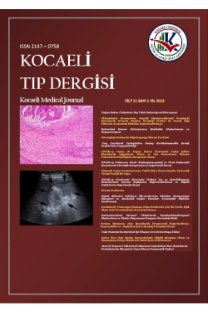Covid–19 Pandemisi Sırasında Uygulanan Sosyal İzolasyon Protokolünün Postoperatif Dönemdeki Bariatrik Cerrahi Hastalarının Egzersiz Düzeyi, Beslenme Alışkanlıkları, Metabolik Parametreleri ve Emosyonel Durumları Üzerine Etkileri
The Effects of Social Isolation Measures Due to Covid-19 Pandemia On The Exercise Status, Eating Behaviours, Metabolic Parameters And Emotional Status of Postoperative Bariatric Surgery Patients
___
- 1. Rolling updates on coronavirus disease (COVID-19). (Updated 29 June 2020). https://www.who.int/emergencies/diseases/novel-coronavirus-2019/events-as-they-happen (Accessed 11 July 2020.)
- 2. Wang C, Horby PW, Hayden FG, et al. A novel coronavirus outbreak of global health concern. Lancet. 2020; 395(10223):470–473.
- 3. Mahase E. China coronavirus: WHO declares international emerge
- 4. Bhasker A. & Greve J. Are Patients Suffering from Severe Obesity Getting a Raw Deal During COVID-19 Pandemic? Obesity Surgery.2020 ; 1-2
- 5. Yeo D, Yeo C, Low TY, et al. Outcomes after metabolic surgery in Asians-a meta-analysis. Obes Surg. 2019. 29(1):114-126.
- 6. Yeo C, Kaushal S, Lim B, et al. Impact of bariatric surgery on serum uric acid levels and the incidence of gout-a meta-analysis. Obes Rev. 2019;20:1759–70.
- 7. Weng TC, Chang CH, Dong YH, et al. Anaemia and related nutrient deficiencies after Roux-en-Y gastric bypass surgery: a systematic review and meta-analysis. BMJ Open. 2015;5(7):e006964.
- 8. Pearl RL, Puhl RM. Weight bias internalization and health: a systematic review. Obes Rev. 2018;19(8):1141–63.
- 9. Washburn, R., & Montoye, H. The Assessment Of Physical Activity By Questionnaires. American Journal Of Epidemiology. 1986;123(4), pp. 563-576.
- 10. Beck AT, Ward CH, Mendelson M, et al. An inventory for measuring depression. Arch Gen Psychiatry. 1961; 4:561–571.
- 11. Beck AT, Epstein N, Brown G, et al. An inventory for measuring clinical anxiety: psychometric properties. J Consult Clin Psychol. 1988;56(6):893–897.
- 12. Beck, A.T., Lester, D. & Trexler, M. The Measurement of Pessimism: The Hopelessness Scale. Journal of Consulting and Clinical Psychology, 1974 : (42), 861-874.
- 13. Turkish Health Ministry TH. Statistics of COVID-19 pandemic. Accesssed 11 July 2020.
- 14. Mitchell NS, Catenacci VA, Wyatt HR, et al. Obesity: overview of an epidemic. Psychiatr Clin North Am. 2011;34(4):717–32. 15. Maggisano M. Maeda A., Okrainec A. et al. Physical Activity and Its Association With Psychosocial Health Following Bariatric Surgery. Appl Physiol Nutr Metab.2019 Dec;44(12):1379-1382.
- 16. Coleman, K. J., Caparosa, S. L., Nichols, J. F. et al. Understanding the Capacity for Exercise in Post-Bariatric Patients. Obes. Surg., 2017 : 27(1), 51-58.
- 17. Sockalingam S, Leung SE, Cassin SE. The impact of COVID-19 on bariatric surgery: re-defining psychosocial care. Obesity (Silver Spring, Md). 2020.
- 18. Yeo D, Toh A, Yeo C, et al. The impact of impulsivity on weight loss after bariatric surgery: a systematic review. Eating and weight disorders : EWD. 2020.
- 19. Burgess E, Turan B, Lokken K, et al. Profiling motives behind hedonic eating. Preliminary validation of the Palatable Eating Motives Scale. Appetite. 2014;72:66–72.
- 20. Boggiano M, Wenger L, Turan B, et al. Eating tasty food to cope. Longitudinal association with BMI. Appetite. 2015;87:365–70.
- 21. Reaves D.L. Dickson JM, Halford J. Et all. A Qualitative Analysis of Problematic and Non-problematic Alcohol Use After Bariatric Surgery. Obes Surg. 2019 Jul;29(7):2200-2209.
- 22. Coulman K, MacKichan F, Blazeby J, et al. Patient experiences of outcomes of bariatric surgery: a systematic review and qualitative synthesis. Obes Rev. 2017;18(5):547–59.
- 23. Magro, D. O., Ueno, M., Coelho-Neto, J. S., Callejas-Neto, F., Pareja, J. C., Cazzo, E. 2018. Longterm weight loss outcomes after banded Roux-en-Y gastric bypass: a prospective 10-year follow-up study. Surg. Obes. Relat. Dis., 14(7), 910-917.
- 24. Cassin, S. E., Sockalingam, S., Du, C., et al. A pilot randomized controlled trial of telephone-based cognitive behavioural therapy for preoperative bariatric surgery patients. Behaviour research and therapy, 2016: 80, 17-22.
- 25. Loddo C, Poullenot F, Rivière P, et al. Malnutrition after bariatric surgery requiring artificial nutrition supplies. Obes Surg. 2018;28(6):1803–5.
- 26. Frame-Peterson LA, Megill RD, Carobrese S, et al. Nutrient deficiencies are common prior to bariatric surgery. Nutr Clin Pract. 2017;32(4):463–9.
- 27. Flegal KM, Kit BK, Orpana H, et al.. Association of all-cause mortality with overweight and obesity using standard body mass index categories: a systematic review and meta-analysis. JAMA 2013;309(1):71–82.
- 28. Inadomi, M. Iyengar R., Fischer I. et al. Effect of patient-reported smoking status on short-term bariatric surgery outcomes. Surg. Endosc. (2017). doi:10.1007/s00464-017-5728-1
- 29. Kowalewski P.K. Olszewski R, Walędziak M.S. et. al. Cigarette Smoking and Its Impact on Weight Loss After Bariatric Surgery: A Single Center, Retrospective Study. Surg Obes Relat Dis.2018 Aug;14(8):1163-1166.
- 30. Moser, F. Signorini FJ, Maldonado PS et al. Relationship Between Tobacco Use and Weight Loss After Bariatric Surgery. Obes. Surg. 26, 1777–1781 (2016).
- ISSN: 2147-0758
- Başlangıç: 2012
- Yayıncı: -
Burns in Children: Data Update with 145 Patients
Mustafa Alper AKAY, Murat Güven TUĞAÇ, Hayrünisa ESEN KAHRAMAN, Osman ESEN, Zekeriya İLÇE
Antitrombotik Ajanların Preoperatif Kesilmesinin Tromboz ve Kanama Riski Üzerine Etkileri
Mehmet EZELSOY, Ayten SARACOĞLU, Kemal Tolga SARACOĞLU
De Quervain Tenosinovit Cerrahisinde Longitudinal İnsizyon mu? Transvers İnsizyon Mu?
Erdinç ACAR, B. Alper GÜLTEKİN
The Impact of Preoperative Anemia in Patients Undergoing Cardiac Surgery
Ayten SARACOĞLU, Mehmet EZELSOY, Kemal SARACOĞLU
Semer Burun Deformitesi ve Rekonstrüksiyonu
Selahattin GENÇ, Fatih ÖZDOĞAN, Halil Erdem ÖZEL
Kronik Böbrek Hastalığında Serum Mg, NO ve IMA Seviyeleri
Ceren DEMİR, Serkan BAKIRDÖĞEN, Hakan TÜRKON, Dilek ÜLKER ÇAKİR, Burak TOK
Comparison of Bone Cement and Incus Transposition Outcomes in Repair of Incus Long Arm Defects
Bayram ŞAHİN, Merve Aliye AKYOL, Fatih ÖZDOĞAN, Halil Erdem ÖZEL, Selahattin GENÇ
Halit Eren TAŞKIN, Gözde İN, Muzaffer AL, Abdullah Kağan ZENGİN
